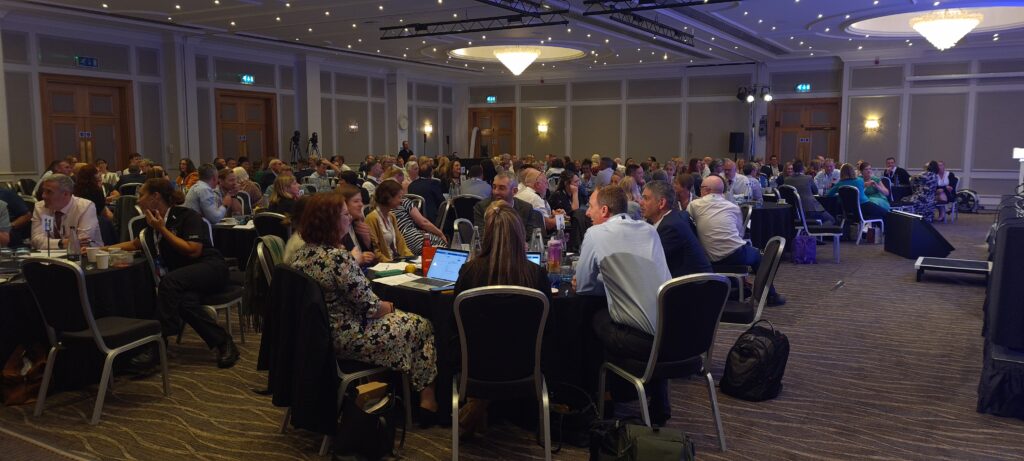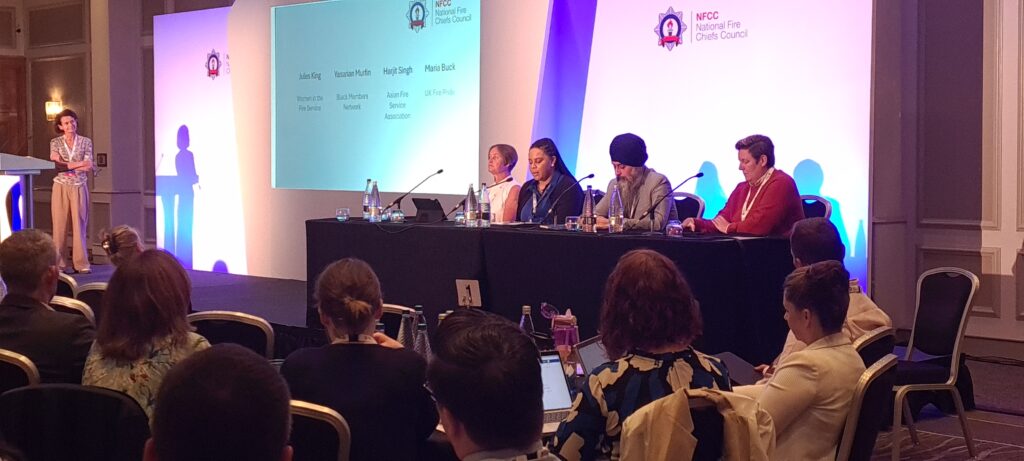Published 18 July 2024
NFCC’s Culture and Inclusion Conference: New products launched to support UKFRS

The second NFCC Culture Conference, held on July 15-16 in Birmingham, brought together Fire and Rescue service leaders and practitioners, and wider stakeholders to reflect on cultural challenges across the UK Fire and Rescue Service, share learning and identify actions to take forward together to deliver improvements.
The event was organised to foster dialogue, share positive practice, and cultivate conversations around actionable plans for creating a more inclusive, diverse, and equitable fire and rescue sector.
Day One: Reflecting on Our Response to Cultural Challenges
The conference kicked off with a welcome address by Kath Billing, Chief Fire Officer of Cornwall FRS and NFCC EDI Lead, followed by an opening speech from NFCC Chair Mark Hardingham. From the start it was clear that this conference would be an opportunity to listen first and foremost to those with lived experience of the negative aspects of fire service culture. Mark and Kath both noted that while there is much to be proud of in Fire and Rescue services, there were still too many instances where services were falling short in ensuring a safe, welcoming and inclusive place to work. The conference was an opportunity to look honestly at the challenges, identity learning and agree next steps in order to deliver lasting culture improvements across fire and rescue services.
The keynote address was delivered by Anthea Sully, CEO of White Ribbon and chair of the NFCC Independent Challenge and support Panel. She spoke on the challenges associated with the prevention work of White Ribbon UK in stopping cycles of violence and misogyny. Drawing parallels with White Ribbon’s work, and culture reform in the UK Fire Sector, she shared with attendees how important it is to consider and cultivate conditions in which a positive culture can thrive.
Roy Wilsher, HMICFRS, provided an update on the State of FRS report, the draft findings of the recent misconduct thematic inspections and progress on the Values and Culture spotlight report recommendations. There were some positives to report, with evidence that strong and effective leadership has led to improvements in some services, but there was also evidence that a lack of diversity and inclusion was affecting staff and public trust and confidence. The session highlighted the importance of transparency and accountability in fostering trust within services and in the community.
Martin Jefferies from the Defence Academy drew parallels with the Defence approach to developing and embedding culture and leadership, , emphasising the necessity of inclusive leadership in driving culture change.
The afternoon sessions focused on the NFCC Culture Action Plan and the products and programmes that can support services in creating more inclusive, more diverse, and safer workplaces. One of the programmes highlighted at the conference was Direct Entry. As the first cohorts of direct entrants progress through their qualification, CFO Rob Barber talked about the opportunities presented by bringing those with a wide range of experience and ideas into the fire service at station manager level.
“We can bring new ideas into the sector that drive change and challenge the status quo. Unless we develop multiple routes of entry into the sector, we will continue to do things the same way while expecting new outcomes.”
It was clear though that Direct Entry doesn’t sit alone. The whole suite of NFCC leadership resources can support services in developing leaders that prioritise the values equality, diversity, and inclusion. Too add to this suite of resources, three new products were launched:
- Culture Dashboard Methodology
- By using this guide, FRSs can create culture dashboards to make informed decisions and drive positive change. A culture dashboard is a tool to help understand culture, find good practices, see where improvement is needed and track the impact of changes.
- Health and Wellbeing Strategic Framework
- This framework has been produced to support everyone across the fire and rescue community to take the necessary steps to develop and deliver health and wellbeing for themselves and their organisations
- Challenging Inappropriate Behaviour Toolkit
- This toolkit aims to support employees in challenging inappropriate or harmful behaviour. This guidance encourages peer-to-peer intervention, giving people the confidence to appropriately address harmful behaviour when they see it.
Interactive sessions allowed participants to engage directly , alongside three other toolkits launched earlier in the year: the Menopause Toolkit, Religion and belief toolkit, and Disability toolkit.

Day Two: Imagining Our Future – Inclusive Culture
Day two began with a presentation from Siobhan Melia, CEO of Sussex Community NHS Foundation Trust and lead for the Culture Review of Ambulance Trusts, who shared the importance of systematic change across the whole ecosystem in order to transform culture. She spoke about importance of balancing people metrics with performance metrics. Her session, followed by a Q&A, offered practical lessons on implementing cultural change in complex organisations.
Representing the Inclusive Fire Service Group (IFSG), Ben Selby from the Fire Brigades Union (FBU) and Sarah Ward from the Local Government Association (LGA) discussed the history, structure and initiatives of ISFG. They showed how embedding practical improvement strategies is vital for forward progress but moving forward from reports and surveys toward solution implementation requires proactive collaboration across partners. Recognising this reality, ISFG is keen to promote a range of resources from across the sector to help drive change.
Presentations from CFOs Andy Roe (LFB), Ben Ansell (Dorset and Wiltshire FRS), and Stuart Millington (South Wales FRS) showcased how different fire and rescue services have responded to independent culture reviews, detailing their improvement plans, alongside challenges and progress made. These case studies provided real-world examples of responding to independent culture reviews and working together with staff and local communities to deliver improvements on the ground.
“When commissioning an independent culture review, it is important engage with someone you know will hold a mirror up to your service, however painful the reflection may be.” Ben Ansell, Dorset and Wiltshire FRS
A highlight of the conference was the lived experience panel, chaired by Susannah Hancock, NFCC CEO. This session brought together representatives from key organisations and networks, including Jules King from Women in the Fire Service, Yasarian Murfin from the Black Members Network, Harjit Singh from the Asian Fire Service Association, and Maria Buck from UK Fire PRIDE. They shared personal stories and discussed their networks’ culture and inclusion priorities, offering a personal perspective on the impact of cultural issues within the service and what their members needed most from the conference attendees in order see lasting culture change Susannah confirmed that the lived experience panel would form the basis of a new lived experience forum, that would meet regularly to help shape and inform NFCC work moving forward.

Mark Hardingham concluded by reiterating that culture and inclusion was the NFCC’s key priority and by saying,
“This is not an improvement journey that any one organisation can take alone. We must work in partnership to bring about much needed change.”
Overall, the NFCC Culture Conference served as a crucial platform for reflecting on work undertaken over the past year, sharing learning and most importantly thinking critically about what individuals and organisations must do together moving forward to foster a more inclusive and positive culture across UK Fire and Rescue Services. The conference closed with a collective commitment to continue to work together to deliver lasting cultural change.
